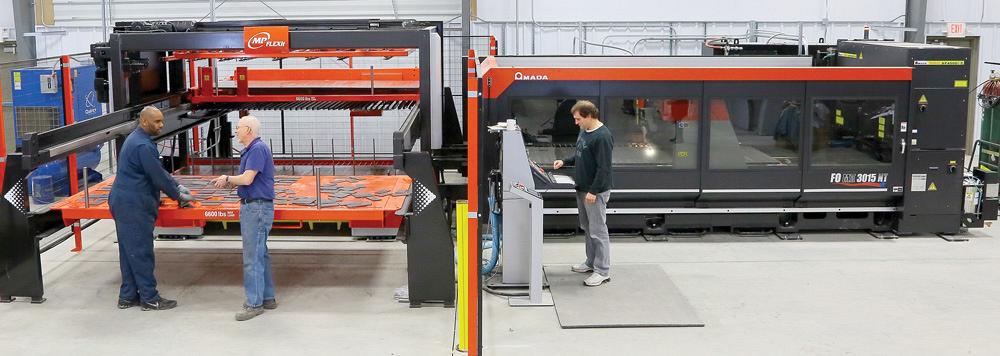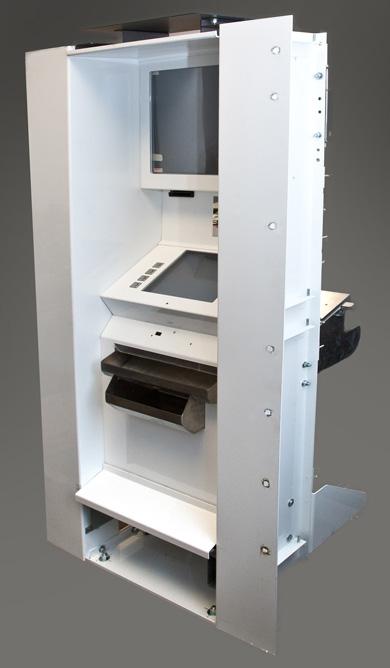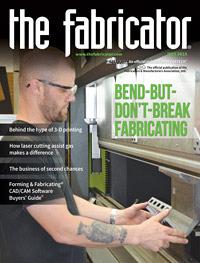Senior Editor
- FMA
- The Fabricator
- FABTECH
- Canadian Metalworking
Categories
- Additive Manufacturing
- Aluminum Welding
- Arc Welding
- Assembly and Joining
- Automation and Robotics
- Bending and Forming
- Consumables
- Cutting and Weld Prep
- Electric Vehicles
- En Español
- Finishing
- Hydroforming
- Laser Cutting
- Laser Welding
- Machining
- Manufacturing Software
- Materials Handling
- Metals/Materials
- Oxyfuel Cutting
- Plasma Cutting
- Power Tools
- Punching and Other Holemaking
- Roll Forming
- Safety
- Sawing
- Shearing
- Shop Management
- Testing and Measuring
- Tube and Pipe Fabrication
- Tube and Pipe Production
- Waterjet Cutting
Industry Directory
Webcasts
Podcasts
FAB 40
Advertise
Subscribe
Account Login
Search
CB Fabricating finds success giving people second chances
Indiana fabricator brings in untapped talent—and thrives
- By Tim Heston
- July 20, 2015
- Article
- Shop Management
A man leaves his apartment under moonlight, walks down the street in rural Anderson, Ind., and arrives at an old building—what used to be Madison County’s first post office—at about 4:30 in the morning. That building is now home to his employer, CB Fabricating. He starts chatting as eight co-workers start arriving. By 4:45 he starts setting up for his shift, which officially starts at 5.
When Chris Barkdull, company founder and president, calls a meeting to discuss a large upcoming project, he walks to the floor, lays the prints on a table, and staff gathers around. Barkdull throws out the question: “So, how are we going to get this done?” Everyone on the team talks through alternatives and discusses how this shop of 11 people will juggle current customer demands with this new one.
Everybody engages. They work together and figure out how to get the job done on time.
The employee who walked to work didn’t choose to live down the street solely for convenience, though it’s not a bad perk. He lives down the street because he can’t drive. He made poor choices, and because of prior offenses, he won’t get his driver’s license back until 2022.
“I’ve got some people here whom nobody else would hire, and they turned out to be the best co-workers,” Barkdull said. “People sometimes make poor choices, or sometimes they weren’t brought up in the kind of environment I was brought up in. God gave me a second chance—actually, he’s given me more than that—so why can’t I do the same thing to my fellow man?”
Barkdull talks about society’s problems, about what he sees as the “give me” generation now entering the workforce. But you won’t hear him complaining about his employees (he prefers the term “co-workers”), even though he finds them in unconventional places, including work-release programs.
He added that he doesn’t pursue this strategy to get cheap labor; he said he pays all employees a competitive wage, far above the minimum. He pursues the strategy because it’s moral and it’s good for business.
Barkdull conceded that some hired for a work-release program do reoffend and stop showing up for work. But some have stayed and become model employees. “They’re thankful for the work, and I’m thankful to have them here. You can’t judge someone by their cover. You need to read their pages first.”
Reading the Pages
It boils down to identifying people with potential, and here Barkdull has a lifetime of experience. For years his brother worked as a fabricator for General Motors. A former foreman at GM told Barkdull that his brother was one of the best fabricators he had ever worked with—and it didn’t surprise him. He grew up in sheet metal fabrication and worked at his parents’ company, which specialized in surgical cases and other medical equipment. “I have pictures of things my brother built in the family business, and I couldn’t even imagine laying them out.”
Yet his brother made some bad life choices (Barkdull kept the details private), and he’s been incarcerated five times. “I’ve watched all of his struggles, and I watched my parents suffer every time something happened. So when I would visit him [in prison], I’d see people there, and I would start talking with them.” He empathized and began to develop a sense of who these people really were.
When it comes to hiring people in work-release programs, Barkdull stays away from violent offenders, of course, but he has identified some who have ended up being critical to the company’s success in recent years. Their book covers weren’t the greatest, but their pages have helped the fabricator succeed.
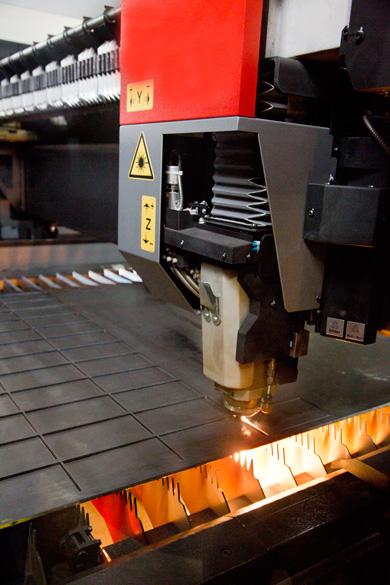
Figure 1
The company recently installed a 4-kW laser with automated
loading and unloading—a far cry from the turret
punch and press brake the owner started with in a small
barn near his home in 2006.
Equal Treatment for All
Barkdull recalled a story from one of his customers, a large contract manufacturing operation. He was told by one of the executives that in morning meetings, if they find their production is behind and they’re in a bind, someone says, “Call CB Fabricating. They’ll get us out of trouble.”
“Those are the stories I like to hear. We may have a $5,000 customer and a $500,000 customer. That doesn’t matter to us. We still give them the same quality and same treatment.”
In Barkdull’s experience, this wasn’t always the case. After his mother sold her fabrication company, Barkdull went to work for a competing, much larger fabricator that also had its own core product lines. When business for those productlines declined, he was told to go out and drum up more contract fabrication work. When the product-line business ramped back up, contract fabrication work was given a lower priority. If a low-revenue customer approached Barkdull during the busy times, he had to tell them that it might be six to seven weeks before the company could deliver. Or he may have been required to turn down the work.
Barkdull didn’t agree with this “hierarchy of work” approach that put high-revenue work ahead of everything else. So in 2006, with his youngest son, Barkdull decided to launch CB Fabricating out of a barn near his house in rural Indiana.
Over the past nine years CB Fabricating has grown into a $2 million fabricator with five press brakes, several of which are programmed offline, as well as several punch presses and a new 4-kW laser (see Figure 1). And it has room to expand. It added 6,500 square feet in 2013, giving a total of 17,000 sq. ft. of manufacturing space.
“It took my parents 20 years and 30 employees to get to where we are today,” Barkdull said, a fact his mother, Julia Kattner, knows well. She now works at CB as an adviser and client manager.
Small Business, Big Ideas
Modern equipment has allowed the company to produce more with fewer employees. Besides three full-time welders, most shop floor workers are cross-trained. One day they may run the turret and laser, the next day they may run one of the press brakes.
“I was surprised about the number of jobs they run every day. It’s really amazing.”
So said Darby Goyer, an intern who decided to spend her spring break not at the beach, but at a local fab shop (see Figure 2). By her second day, she had observed and helped program the laser and learned some basics about press brake bending and sheet metal layout. Her technology instructor at the local high school is one of Barkdull’s friends, and when Goyer was looking for internship possibilities over spring break and summer, that instructor connected her with CB Fabricating.
She arrived at a company that tests what an 11-person shop can accomplish. Along with serving a range of custom fabrication customers, Barkdull and his co-workers have developed a line of ticketing kiosks. The kiosks are branded under the Self Serve Solutions name. If you attended a state fair or similar amusement venue recently in Indiana, Tennessee, or a handful of other states, there’s a good chance you bought a ticket through one of CB Fabricating’s kiosks, designed to accept cash, credit, and debit cards. The products even have accounting software with built-in traceability for every transaction (see Figure 3).
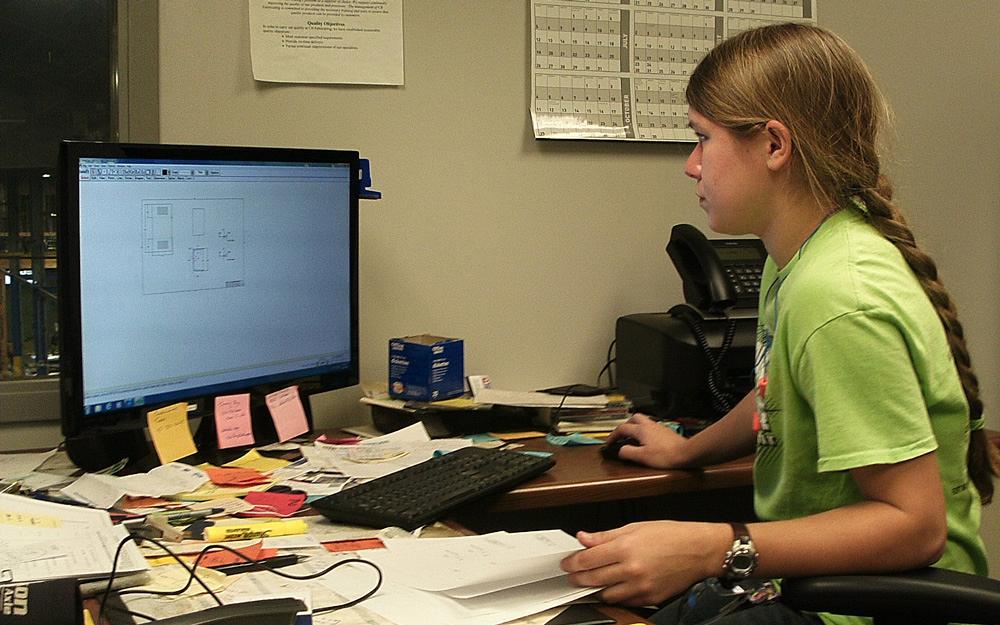
Figure 2
Darby Goyer, an intern at CB Fabricating, recently graduated
near the top of her class. She plans to spend the
summer working at the shop full-time.
“We’ve been told it’s the first of its kind,” Barkdull said. “So far we’ve had a zero failure rate [building the kiosks], and we do everything from the fabrication to the electronics, assembly, and even installation.”
The intern also arrived at a company of friends. Jim Carr, engineering manager, joined CB Fabricating five years ago after years of selling press brake tools and equipment on the road (see Figure 4). “He would call, and he was always worried more about my lifestyle than how the business was going,” recalled Barkdull, a self-described workaholic whose friends encourage (sometimes a bit forcefully) him to take a little time off. “He has been a good mentor and a good friend. About five years ago, he called me and said, ‘Chris, I just want you to know, today is the last day I’ll be driving between Muncie and Indianapolis [about an 80-minute drive one way]. Today is my last day. I’m handing in my notice, and think you need to hire me.’ That was one of the best decisions ever made.”
The intern also arrived at a company that gives people second chances. CB Fabricating couldn’t compete without technology, but the shop may have one competitive advantage that’s difficult to duplicate: the ability to identify potential even in those who slipped through the cracks in society.
Barkdull conceded that not every shop owner would take such risks. Still, his knack for identifying talent, for seeing past the cover and reading the pages, has contributed to the shop’s success. It may be proof that good morals can indeed lead to business success.
About the Author

Tim Heston
2135 Point Blvd
Elgin, IL 60123
815-381-1314
Tim Heston, The Fabricator's senior editor, has covered the metal fabrication industry since 1998, starting his career at the American Welding Society's Welding Journal. Since then he has covered the full range of metal fabrication processes, from stamping, bending, and cutting to grinding and polishing. He joined The Fabricator's staff in October 2007.
Related Companies
subscribe now

The Fabricator is North America's leading magazine for the metal forming and fabricating industry. The magazine delivers the news, technical articles, and case histories that enable fabricators to do their jobs more efficiently. The Fabricator has served the industry since 1970.
start your free subscription- Stay connected from anywhere

Easily access valuable industry resources now with full access to the digital edition of The Fabricator.

Easily access valuable industry resources now with full access to the digital edition of The Welder.

Easily access valuable industry resources now with full access to the digital edition of The Tube and Pipe Journal.
- Podcasting
- Podcast:
- The Fabricator Podcast
- Published:
- 04/16/2024
- Running Time:
- 63:29
In this episode of The Fabricator Podcast, Caleb Chamberlain, co-founder and CEO of OSH Cut, discusses his company’s...
- Trending Articles
Tips for creating sheet metal tubes with perforations

JM Steel triples capacity for solar energy projects at Pennsylvania facility

Are two heads better than one in fiber laser cutting?

Supporting the metal fabricating industry through FMA

Omco Solar opens second Alabama manufacturing facility

- Industry Events
16th Annual Safety Conference
- April 30 - May 1, 2024
- Elgin,
Pipe and Tube Conference
- May 21 - 22, 2024
- Omaha, NE
World-Class Roll Forming Workshop
- June 5 - 6, 2024
- Louisville, KY
Advanced Laser Application Workshop
- June 25 - 27, 2024
- Novi, MI
























